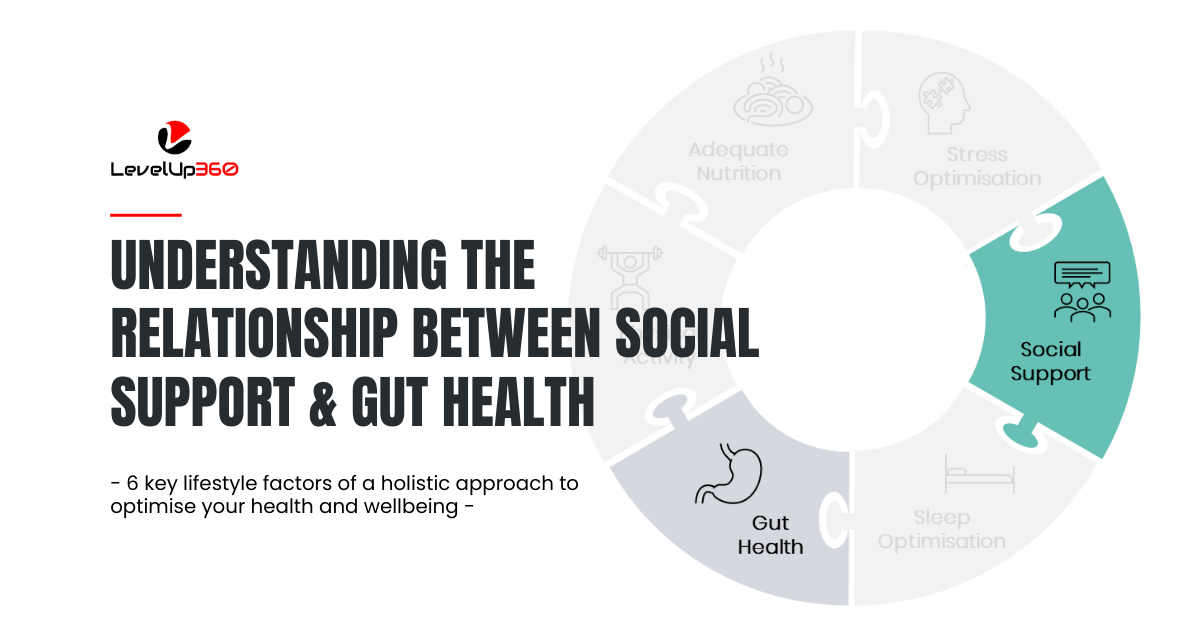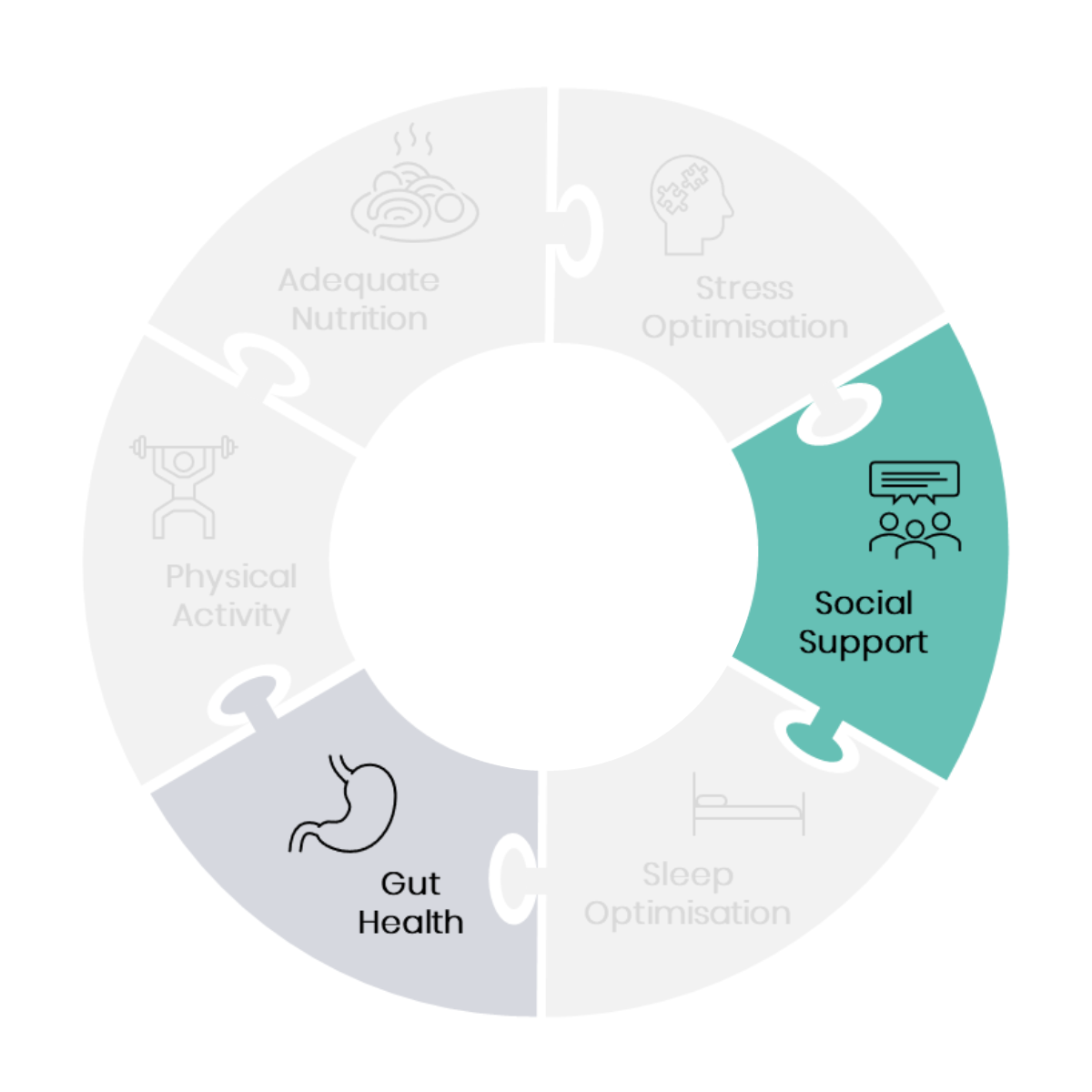
Understanding the relationship between stress and gut health
This is Part 5 of a series of articles focusing on the interplay between adequate nutrition, physical activity, gut health, sleep optimization, stress optimization, and social support, and their importance in achieving and maintaining optimal health.
In Part 5, we explored the relationship between exercise and gut health (I would recommend you read Part 1, Part 2, Part 3, and Part 4 if you have not already, and then come back to this article).
The relationship between social support and gut health is an emerging area of research, but it has been suggested that social support can have a significant impact on gut health.
The impact of social support on gut health
Social Support and its impact on gut health
On one hand, social support can have a significant positive impact on gut health by:
- Reducing stress: Social support can help reduce stress levels, which is crucial for gut health. Chronic stress can trigger an inflammatory response in the gut, leading to conditions such as inflammatory bowel disease (IBD), irritable bowel syndrome (IBS), and gastroesophageal reflux disease (GERD).
- Improving mental health: Social support can improve mental health, which can positively impact gut health. Depression and anxiety can lead to a range of digestive disorders such as IBS and GERD.
- Increasing physical activity: Social support can encourage physical activity, which can help to improve gut health. Regular exercise can promote healthy bowel movements, reducing the risk of constipation and other digestive problems.
- Encouraging healthier eating habits: Social support can also promote healthier eating habits, which can improve gut health. Eating a diet that is high in fiber, fruits, vegetables, and whole grains can promote healthy digestion and reduce the risk of digestive disorders.
- Improving immune function: Social support can boost the immune system, which plays a crucial role in maintaining gut health. The gut microbiome is responsible for regulating immune function, and a healthy microbiome can prevent infections and reduce the risk of inflammatory bowel diseases.
- Reducing inflammation: Social support can help reduce inflammation in the gut. Inflammation is a common factor in digestive disorders such as IBD, IBS, and GERD, and reducing inflammation can alleviate symptoms and improve gut health.
- Improving sleep: Social support can improve sleep quality, which is important for gut health. Poor sleep can disrupt the gut microbiome and lead to digestive problems. Download our free “Sleep Secrets Cheat Sheet” for more information.
- Reducing the risk of chronic diseases: Social support can reduce the risk of chronic diseases, such as obesity, diabetes, and cardiovascular disease. These diseases are associated with poor gut health, and reducing the risk of these conditions can improve overall gut health.
Social support is a vital aspect of overall health and well-being, and it can play an important role in promoting gut health.
Social support can also have a potentially negative impact
On the other hand, social support can also have a potential negative impact on gut health by:
- Creating social stress: Negative social interactions can cause stress, which can negatively impact gut health. Social stress can lead to an increase in inflammation in the gut and contribute to the development of digestive disorders.
- Encouraging unhealthy eating habits: In some cases, social support can lead to unhealthy eating habits. For example, attending social events or gatherings that involve unhealthy food choices can negatively impact gut health by increasing the intake of processed foods, sugar, and unhealthy fats.
- Leading to peer pressure: Social support can sometimes lead to peer pressure, which can negatively impact gut health. For example, feeling pressure to eat or drink in social situations can lead to overconsumption of unhealthy foods and drinks, negatively impacting gut health.
Negative social support and lack of social support can have a negative impact on gut health.
In addition, negative social support and lack of social support can have a negative impact on gut health.
- Negative social support can include criticism, negativity, and invalidation, which can lead to stress and negatively impact gut health.
- Lack of social support or social isolation can have a negative impact on gut health. Social isolation can lead to stress, depression, and anxiety, all of which can negatively impact gut health.
The impact of gut health on social support
Gut health can have a positive impact on social relationships
Although less evident, good gut health can have a positive impact on social relationships by:
- Reducing stress: Good gut health can reduce stress levels, which may improve social support by helping individuals to be in a positive mood during social interactions.
- Improving mental health: Good gut health has been linked to improved mental health, including reduced anxiety and depression, which can lead to better social support by enabling individuals to form and maintain positive social relationships.
- Increasing energy: Good gut health can increase energy levels, which can improve social support by encouraging individuals to participate in social activities.
- Improving immune function: Good gut health has been linked to improved immune function, which can lead to better overall health and thus better social support.
- Improving nutrient absorption: Good gut health can improve nutrient absorption, which can lead to better overall health and thus better social support.
- Reducing inflammation: Good gut health can reduce inflammation in the body, which can improve overall health and thus better social support.
- Reducing digestive symptoms: Good gut health can reduce digestive symptoms such as bloating, constipation, and diarrhea, which can lead to better social support by enabling individuals to participate in social activities without discomfort.
- Improving sleep: Good gut health has been linked to improved sleep quality, which can improve overall health and thus better social support.
- Improving the quality of life: Good gut health can improve the overall quality of life, which can lead to better social support by enabling individuals to enjoy social activities and relationships to a greater extent.

An unhealthy gut can negatively impact social support
Conversely, an unhealthy gut can negatively impact social support by:
- Causing digestive symptoms: Poor gut health can cause digestive symptoms such as bloating, constipation, and diarrhea, which can make it difficult for individuals to engage in social activities and maintain positive social relationships.
- Causing fatigue: Poor gut health can cause fatigue, which can lead to social isolation and difficulty in participating in social activities.
- Causing mental health issues: Poor gut health has been linked to mental health issues such as anxiety and depression, which can make it difficult for individuals to form and maintain positive social relationships.
- Reducing immune function: Poor gut health can reduce immune function, which can lead to frequent illness and absence from social activities.
- Increasing inflammation: Poor gut health can cause inflammation in the body, which can lead to chronic health issues and reduced ability to engage in social activities.
- Negatively impacting sleep: Poor gut health can cause sleep issues such as insomnia, which can lead to reduced energy levels and difficulty in participating in social activities.
LevelUp360 Gut Health TIP: Strengthen your social relationships.

Social support is a vital aspect of overall health and well-being, and it can play an important role in promoting gut health.
Strengthening social relationships can have a positive impact on gut health. Spending quality time with loved ones, for example, can help to build stronger relationships and improve social support. Sharing meals together can also encourage healthier eating habits, which can positively impact gut health.
Joining a community group or engaging in physical activities with others, is another way to improve social relationships and promote gut health. Engaging in activities with others who share common interests can reduce stress and improve mental health, which can positively impact gut health. As we explained in Part 5, regular exercise can also positively impact gut health by promoting healthy digestion.
Being open and honest with loved ones about how you are feeling can help to strengthen relationships and improve social support. This involves expressing your emotions and discussing any challenges or concerns you may be facing. By doing so, you can receive emotional support and potentially reduce stress levels, which can have a positive impact on gut health.
Active listening is an important aspect of building strong social relationships. This involves paying attention to what others are saying, asking questions, and responding appropriately. Active listening can help to build trust and empathy, which can improve social support and reduce stress levels.
Recommended reading
Recommended reading
Additional Resources
Feeling in control of your health
If you are interested in improving your health and wellness, check out other resources such as Our Blog, Free Resources and/or join our private Body-Mind Transformation Secrets Community on Facebook, and The 360 Transformation Blueprint Podcast on Spotify and go on an even deeper dive with me to uncover how to succeed in your health and wellness goals.
You may also be interested in our Sleep Secrets Cheat Sheet. It is a great resource with strategies to fix and optimize your sleep which is crucial to succeeding in your health and wellness goals.
Resources
Pictures





